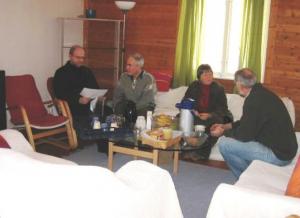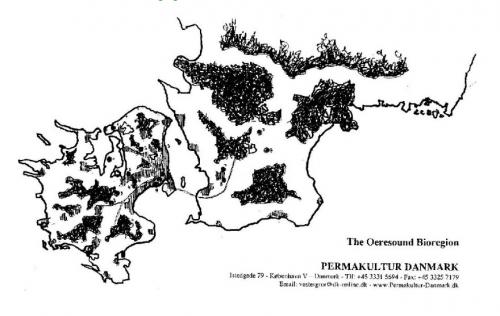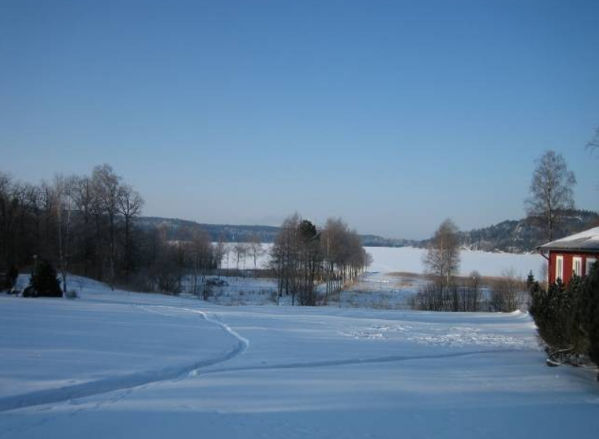The Northern School of Permaculture
You are here
"Plan B" for Permaculture
Peak Oil - Energy Increase, and the Dangers of Shifting in Permaculture Focus
 Written by Poul Erik Pedersen and Tony Andersen, with the support of the other participants at the scandinavian Permaculture Teachers’ Seminar in Svenshogen, Sweden, March the 3rd-5th, 2006: Chris Druid, Dan Frendin, Henning Hervik, Per Rune Hollup, Peter Norrthon. Permakultur Danmark
Written by Poul Erik Pedersen and Tony Andersen, with the support of the other participants at the scandinavian Permaculture Teachers’ Seminar in Svenshogen, Sweden, March the 3rd-5th, 2006: Chris Druid, Dan Frendin, Henning Hervik, Per Rune Hollup, Peter Norrthon. Permakultur Danmark
Edited by Angus Soutar – original English version available here
We live in interesting times, to say the least. The breakdown of human global society now seems unavoidable, due to the increasing unsustainability of human activity on Earth.
The evidence for this is multiple and growing in weight. Crises are rising in many vital areas for human sustenance: energy supply, water supply, food supply, soil deterioration, erosion and deforestation, climate change. In addition, there is the increasing scarcity of mineral resources and the complexity of economic and political instability in the world.
This may seem obvious, almost to the point of being banal. After all, many of us are already living in the middle of developing breakdowns. But underneath the obvious, this also points to a psychological truth that is more subtle and evasive in its nature.
We permaculturists have almost always been working from a simple notion. This is the idea that what we were doing would help prevent disaster and “save the planet”, bringing about a situation of sustainability and wellness in life. It might even be true to say that wishing and hoping to avoid the looming ecological breakdown was what caused the whole Permaculture “movement” to be born in the first place (or, at least, allowed it to gain momentum).
We call this “Plan A for Permaculture”.
This was the prospect from the early ‘70s: by distributing the knowledge and practice of permaculture we would be able to partake in ‘saving the world’ from its destructive fate. And it might well be true to say that this hope and wish got printed into the subconscious of us permaculture people. And that we as a collective are still motivated by a vision of being able to produce a beautiful way of life so appealing and strong, that we would be able to increase, gain a majority and help humanity avoid disaster, almost automatically by the self explaining and convincing nature of permaculture in itself.
Maybe this is the central and most dominant thought pattern that accounts for the apparent rise in desperation that now seems to occur, in permaculture writings and presentations, projects, of recent years.
One expression of this ‘hidden desperation’, as we see it, is the sudden focus that appeared on Peak Oil and Energy Descent. Yes, there is an Oil Peak situation developing, this we don’t doubt. And it will be likely to have some very disturbing impacts on our societies and economies, this we don’t doubt either. But we doubt very much that the Oil Peak will bring about an Energy Descent situation, where societies globally will adjust themselves to a situation of radically reduced energy consumption in a relatively short time.
One possible scenario is that the world's future energy supply will be based on pulverised coal in fluidised beds and nuclear power, in the main, for the foreseeable future. Supplemented of course by renewable energy resources, but only as a minor energy source within the total, perhaps by 30-40% if we are lucky, and primarily to be used in the less densely populated regions, which are different to the technology-demanding cities of the world. (Cities now account for more than half of the worlds' population). China and India are focusing on the development of more energy-efficient technologies rather than reducing their total energy consumption.
Another scenario is the hydrogen society coming to save us all. Hydrogen will be less polluting as a fuel, that’s true. But making hydrogen is an enormously energy-consuming process, based on putting electricity into water. And if the oil has run out this electricity can only come from one place: huge power plants working on coal or nuclear energy. In some part of the world, that could mean wind, water, waves and solar energy, also. But whichever the energy source, the world demand for energy will continue increasing enormously. Notwithstanding in a coming hydrogen-era.
Given the insatiable nature of humans, there is no rationality in the thinking that energy consumption will decrease, as long as there are alternative sources available. On the contrary, it is most likely that energy consumption globally will continue to rise for a good long first half of this century, even in spite of increasing evidence that this will also continue to increase the pressures on the world’s climatic and political stability.
Thus, we believe that world change will be more likely to enforce itself on the background of water shortages, violent weather phenomena and rising sea levels, combined with the expectable chaotic conflicts for control of resources. This process will be catastrophic in nature, rather than adjusting to peaceful transition. The catastrophe probably won’t happen all over the world in one go, but it will probably be in the form of increasing numbers of local ‘disaster phenomena’ happening in different countries and regions, at ever increasing rates.
In this context, the word ‘crash’ itself can be misleading. When we say ‘crash’, we think of some accident that happens fast, with the smoke clearing and everyone adapting to a new set of conditions in the aftermath. But what if ‘the crash’ will take form of one long grinding series of breakdowns that will go on smouldering, destructively, for the next 50-100 years? In that case, we can’t hope for any kind of relief within the crash situation, but we had better instead adopt a robust stance of being prepared for a lifetime’s permanent crisis management. (Which in some ways we are already doing).
Why do we want to argue against focusing on Peak Oil and Energy Descent, if the Oil Peak may also add to the catastrophes? Well, for two reasons.
First, because we see it as a symptom of wanting to fasten on a singular, graspable problem. And from there, we wish to come up with some singular, graspable solution. We think this will constitute a structural warp in our reasoning and analysis.
Second, because if we make noises in media about “The Oil Peak is coming!”, and then the Oil Peak doesn’t bring immediate disaster, it will add to the public view of us as a bunch of untrustworthy dreamers. And, in the meantime, it may have stolen attention from other dangerous breakdowns that are developing.
We are no longer in a situation where we can expect the crash to be avoidable. Plan A for permaculture didn’t work — we couldn’t prevent the crash (or crashes) from coming. Now is therefore the time where we must change our mind-set and look to activate Plan B instead: This means looking at how we can equip ourselves to handle crashes as they are developing, and how we can enable ourselves to play a constructive role in the coming times of turbulence and great collective stress.
Plan B requires us, in our projects and approaches to the surrounding society, to systematically seek to become of essential value to those around us in our locality. If not, we will likely be sacrificed and washed away in the inevitable conflicts to come, and the primitive processes of protectionist exclusion that will be the expected response of society groupings. This is a worrying prospect to the extent that some eco-villages and permaculture projects have developed isolationist and even elitist attitudes towards their surrounding bioregions.

This is where the concept of the Bioregions comes in, as an important aspect of permaculture. If we want to survive the crash, we should have already started to build up some robust bioregional networks in order to have the people, the knowledge and the contacts ready for action. Our resources need to be organised geographically, according to the areas that can supply themselves with all basic resources, preparing for disruption to our modern (and vulnerable) supply-systems.
Thus, it becomes a basic necessity for handling the crash that we don’t start shifting in our focus away from what has always been at the core of permaculture: the balanced, rational and effective analyses of resource cycles, the attached toolbox, the of practical advice on how to create permanently sustainable settlements. Let's be very practical, down-to-earth and based on ecologically sound and reasoned weight of evidence.
We shouldn’t start looking for singular, accommodating solutions. This is to look for treatment of symptoms, and not the causes, and it will fail to produce lasting results for us. We must stay with the multiplicity of wholesome analyses of permaculture, searching for the causes rather than the symptoms, going from the bottom up, even if it doesn’t produce spectacular results that look convincing and appealing in the eyes of world media, today.
One approach that can help us to maintain this multiple focus would be to keep promoting the aspect of forestation and plantation generally, as we always did, right from the beginning. Forests and other forms of densely planted landscapes have always been the main accumulators and cleaners of our vital natural resources — soil, water, clean air and oxygen, energy resources. And still we should look to the forests for solutions and example of sustainability, and as a spectacle for permaculture analyses and action programs. This might help us stay focused on the core values and practices of permaculture. These won’t lose their pertinence as long as Earth’s ecological dynamics and natural laws stay the same.
Some say that, as part of the solution, we should do what we can to become part of the mainstream and get more visible. ldeally, of course, this is true. But experience tells us, that mainstream integration is a soul-destroying adventure. The mainstream will never applaud our suggested solutions. What mainstream society wants is relief from feelings of discomfort and pain. Which is not the same as a remedy or cure.
Thus, if we go mainstream, the prospect is that we’ll adapt to what mainstream wants, and lose our justifiable base in the process. What we should do instead, is to stay ‘headstream’ — keeping our departure points in pristine shape, our tools fit and sharpened, continuing to develop the accuracy and integrity of the permaculture approach, ready for use. One day, demands may spring from a serious understanding of needs and mechanisms, and a serious will to do what it takes. Meanwhile, we will have to endure the ignorant and spoilt wishes of today’s world to maintain its extravagant lifestyle.
Let’s not get sidetracked by wishful thinking. The world is far too dangerous already as it is, and it is going to get worse during the coming decades. Eventually, the world population collectively will no longer be able to deny the reality of our track towards mutual disaster. and accept the fact that the solutions must be equally mutual. But until that happens, we must hope for the best, but plan for the worst! And work hard to prevent the most primitive traces in human nature from becoming invigorated and coming to surface.
We need as permaculturists to stay rational and cool in our analyses, not to start confusing our vision with bright futures dreamed up from an internal need for optimism and a gratifying self-view. If the future for the time being looks depressing, so be it. We think it is better to have a clear view of the world, even if it is depressing, rather than to integrate a systematic warp into our ongoing analyses just to be able to keep up good spirits. Our vision will only be trustworthy and able to show sustainability through a constantly developing friendship and trusting cooperation.
In our developed permaculture strategies and connections that would mean setting up our bioregional networks and structures. This task will, for the next hundred years or so, give us much enjoyment, pleasure and a lot of hope for ourselves and even for our grandchildren.

- Log in to post comments
Theme by Danetsoft and Danang Probo Sayekti inspired by Maksimer
